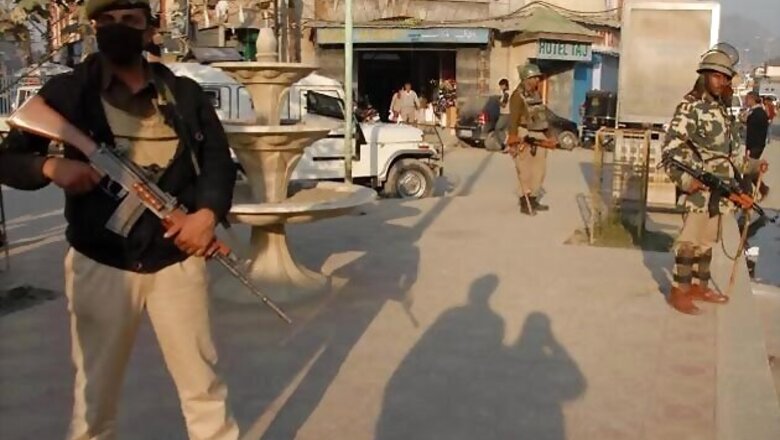
views
Srinagar: Even as voting for the five-phase Jammu and Kashmir Assembly elections started on November 25, there is a fear among the people in the Valley that the situation may turn for the worse if the new government fails to provide a clean, corruption-free and efficient administration.
A political analyst in Srinagar who is also involved in pursuing cases of human rights abuse by security forces and government machinery claimed that Kashmir Valley is "dormant" at present and if grievances of its people particularly the youngsters, most of whom are unemployed, is not addressed soon, then militancy may raise its head once again.
While pointing that separatist leaders like Syed Ali Shah Geelani of the All Parties Hurriyat Conference (hardline faction) don't have as much following now as they used to have in the 1990s or early part of the 21st century, he added that people don't vote in many areas as they have lost faith in most of the state leaders and parties and not because of boycott calls given by separatists.
Citing the example of the 2010 stone-pelting incidents in Srinagar when around 120 youngsters were killed by security forces, he said that thousands of boys - some of them as young as 12 years - were arrested and put up in jails with hardened criminals and terrorists.
"All of them have police records now. They are ineligible for government jobs. In a few years they will have families to support. What will they do then? The Indian government and the state should find a solution to this problem. In India a minor cannot be arrested and the police cannot even touch them. But here in Kashmir Juvenile Justice Act was not used and they were simply jailed. They will certainly not come out of jail as saints if they are put up with someone who is from the Laskar," he said. He added that the youngest boy killed during the 2010 stone pelting was Batmaloo's 7-year-old Sameer Ahmed Rah who was beaten to death.
His views are also echoed by several people in Srinagar as well as other parts of the state including Hazrathbal, Ganderbal, Sonwar, Bandipora and Kangan.
There is a feeling that Kashmir has suffered because of the power game played by India and Pakistan with the state leaders being used as pawns.
A rather agitated group of elders in Ganderbal said that "azadi" (freedom) for Kashmir is the only solution. "We are with Geelani sahab. We want azadi. Both India and Pakistan should stay away from us," they added even as Central Reserve Police Force troops were stationed just a few meters away.
In Zakoora area of Ganderbal constituency, 25-year-old Athar Ahmed, who runs a meat shop, claimed that despite being a science graduate with first class he could not get a government job as he failed to bribe officials.
"Many youngsters like me are completely disillusioned as we have nothing to do. Private sector is almost non-existent here and even if one gets job in a private firm, the salary is a pittance. If boys don't have any work, then it is very easy to motivate them to throw stones. Some of them may even join militancy," said Ahmed.

Even the local police is seen as a "terror force". "Police officials arrest people under various sections and then demand huge bribe to release them. Several people are arrested under the Jammu and Kashmir Public Safety Act and then their families are forced to pay Rs 50-60,000 to get them released," said an Association of Parents of Disappeared Persons member.
Though several thousand people are non-traceable after being arrested and detained during crackdowns by security forces, yet it is not a major election issue. Describing the cases as "enforced disappearances", he said neither the government nor security agencies want to own responsibility as they want to save their people.

The Armed Forces Special Powers Act, too, came under severe criticism. Describing it as draconian, he said that under it the Army is shielded but not the civilian whom the soldiers should protect.
"When the Army has been withdrawn from many cities and town of Kashmir, then why is the AFSPA still in force? Neither the government in Delhi nor the state government is interested in revoking it. If normalcy has to return, then such draconian laws should go," he said.
He admitted that terror cases have come down but added that those picking up the gun now are more motivated and better educated than those who did so in the 1990s. "It is a worrying sign. Our boys don't have jobs. They are restless and can be easily motivated to pick up the gun. Earlier there were thousands of boys who crossed the Line of Control, now only a few do it but they all are highly educated. Many of them are engineers and post graduates," he added.
Claiming that Kashmir is yet to become normal, he said that it can only happen if corruption ends, security forces are held accountable for human rights violations and the state develops.

















Comments
0 comment